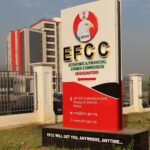Radiation: Nigeria not under threat –NNRA
November 7 2017
 The Director- General of the Nigerian Nuclear Regulatory Agency (NNRA), Prof. Lawrence Dim, on Tuesday in Abuja said Nigeria was not under any radiation threat.
The Director- General of the Nigerian Nuclear Regulatory Agency (NNRA), Prof. Lawrence Dim, on Tuesday in Abuja said Nigeria was not under any radiation threat.
Dim said this to newsmen on the sidelines of the Second National Meeting on Personal Dosimetry for Dosimetry Service Providers and Radiation Safety Advisers (RSAs).
Wikipedia describes dosimetry as the measurement, calculation and assessment of the ionizing radiation dose absorbed by the human body both internally, due to ingested or inhaled radioactive substances, or externally due to irradiation by sources of radiation.
Represented by the General Manager, Radiological Safety, Prof. Timothy Akpa, Dim said the NNRA had kept up regulation standards.
He explained that dose was the energy that the body took when you irradiated the body (that is exposing the body to radiation).
“You measure it and make sure that the amount of energy that enters and is retained in the body is not so much as to cause biological damage in the body.
“Every country wants to have its own standard, because if we have our own standards, we would know what we are giving out. There is no threat yet.
“Standards have not been compromised. We have our own definite national standards traceable to primary UN standards in Vienna. What we call standards are radiation sources that well calibrated and well known.
“Calibrated at the primary proximity centre, their source conditions are all well known and when you want to make calculation, you are sure of what you are calculating.
“Radiation is natural and always constant, so there is no compromise. There is no way it can change,’’ he said.
He said Nigeria was in the throes of converting radiation to produce electricity, though it was used in some parts of the world for heating purposes.
“As I once said, it may likely be that in the future, as safety consciousness grows all over the world, we would soon begin to have vehicles running on fuel of radioactive materials.
“Nigeria cannot afford to be behind. As long as we are building more industries, the refineries and so on, we need radiation to monitor what we are doing.
“The most important is even in health. All aspect of medical services, diagnosis, interventional radiology, radiotherapy and even nuclear medicine, all require radiation.
“And anywhere there is radiation, there is the possibility that we would also have to be sure that the use conforms to the internationally recognised dose limits,’’ he said.
A nuclear consultant and participant at the one-day event, Mrs Modupe Oresegun, told newsmen that one of the major challenges with some clients was that after they got the licence, they evaded monitoring.
Oresegun said, “they do not follow up with us so we are no longer involved in the day-to-day safety issues.
“We are going to complain to the NNRA so that they can force them; it is not about getting a licence, it is about maintaining some sort of safety every day, every time they are working.
“Nigeria is doing great in areas of radiation. This is one of the few regulatory bodies that are effective.
“This is because they partner with international bodies and nobody can import any radiation sources into this country without a licence’’.








